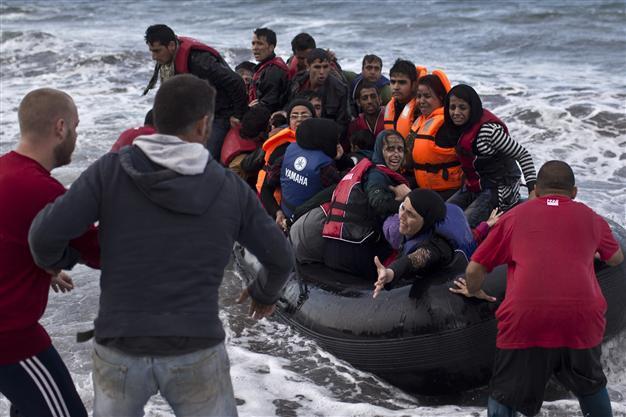Rescue volunteers cry for help on Greek island's tragic shores
MYTILENE, Greece - Agence France-Presse

Volunteers approach a rubber boat at a beach on the northern coast of Lesbos, Greece, Saturday, Oct. 31, 2015. AP Photo
On a rocky beach on the Greek island of Lesbos where the bodies of drowned migrants wash up almost daily, exhausted rescue volunteers hold their heads in despair."The situation is crazy," says Essam Daod, a Palestinian doctor working with Israel-based humanitarian agency IsraAid.
"There are thousands of migrants coming every day. We can't handle the situation," says the Haifa resident, who took unpaid leave so he and his wife could come and help out.
Lesbos lies on the frontline of a massive migration wave that has overwhelmed Europe, with over 700,000 people crossing the Mediterranean this year and thousands dying in the attempt.
Pressure on Greece began building in the summer but with the weather now rapidly deteriorating, sailing the Aegean Sea from neighbouring Turkey in ramshackle boats has become even more perilous for entire families fleeing war and poverty in the Middle East.
"The situation is getting worse because of the weather, there are strong winds," says Daod, who helped to save shipwrecked families, mostly Syrian, on the beach of Skala Sykaminias for three weeks.
Over 80 migrants, many them children, have died in Greek waters alone this past month according to an AFP count.
"The purpose of coming here was to save lives and when you don't, you feel guilty, you have nightmares," says Daod, his voice cracking as he remembered a man he failed to revive.
"The water that comes out when we press their chest, it's something that chases me in nightmares all the time."
On other occasions, he could do nothing beyond saying a prayer for the dead on the beach.
"There is an emotional attachment with the people of my nation," he says, noting that many of the people he met were second-generation refugees from Palestine.
Working around the clock, many volunteers say prominent organisations have been conspicuously absent and that keeping vital supplies going is a daily struggle.
"There are not enough bottles of oxygen, there are only two ambulances. People are helping but there is not enough," says Daod, who unsuccessfully pushed his organisation to let him stay longer on the island.
"I've seen one guy from the UN but no one else. There are just some tents and blankets given from the UN," the Palestinian medic says.
"I don't see any large NGOs that I would be used to seeing in the US, most of the people I've met came on their own," says Amy Shrodes, a 25-year-old American who was on her way to India when she decided to change trajectory after seeing disturbing images of desperate migrants risking their lives to find safety in Europe.
"I love to cook...to give them nutritious food that will help them on their journey, because they're going to have a long way to go," she adds.
The authorities on Lesbos have faced criticism since the summer for not doing enough to help the migrants.
But the island's mayor Spyros Galinos says extensive amounts of money have been spent in trying to manage the enormous influx.
"How can a small island alone handle the daily arrival of 6,000 refugees?" he asks.
Of the 218,000 migrants and refugees who crossed the Mediterranean in October, 210,000 landed in Greece, mostly on Lesbos.
Galinos said he would raise the issue with European Parliament chief Martin Schultz, who is expected to visit the island this week.
"Refugees should not have to risk their lives, we should create a safe path for them to reach Europe," says Gerard Canals from the Spanish aid group ProActiva Open Arms.
The Spanish, who operate two jet skis, have been widely praised for helping the Greek coastguard keep up the rescue effort.
"The coastguard is overwhelmed, they cannot respond to all calls," says Canals.
But he adds that "the Greek state but mainly the European Union should do more" to provide resources.
Daod says that although he has gone hungry and sleepless, the experience has made him a better person.
"It's like heaven for humanity...everyone wants to help, everyone just put their lives aside and came here," he says.
















